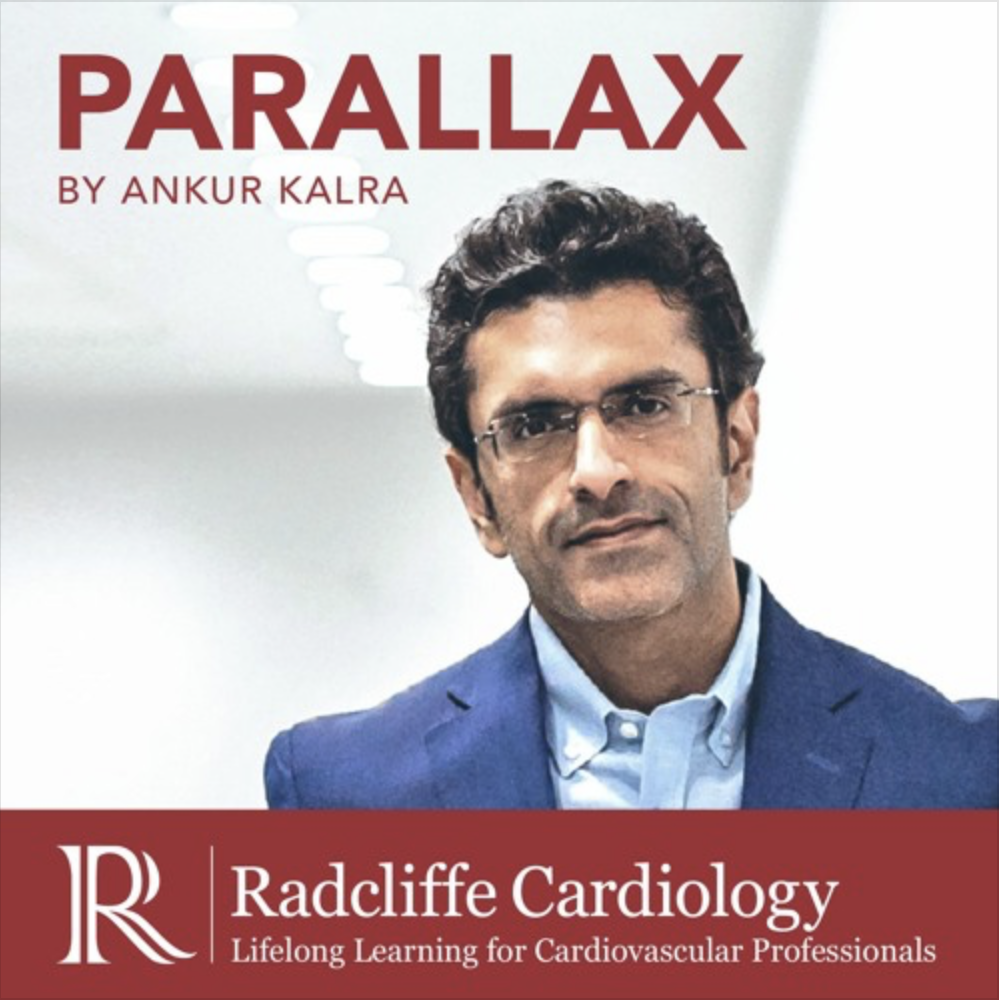
16: Ajay J Kirtane On Fatherhood, Cardiology, Research & Even A Little Karma Yoga
In Episode 16, Ankur spoke with Ajay J Kirtane on why he became a cardiologist, how he fell into academic research, and why the cardiology specialty is heavy with people of Indian origin.
Ajay also talks about how he has negotiated between competing priorities in clinical and academic work, and how he manages fatherhood with a busy career. Ahead of the American Heart Association Scientific Sessions 2019, Ajay also shared what he thinks we can expect from the highly anticipate ISCHEMIA trial. Submit your question to Ankur via: podcast@radciffe-group.com.
Hosted by @AnkurKalraMD. Produced by @RadcliffeCARDIO.
Read MoreRead Less
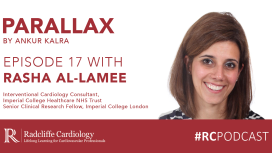
Recorded before the American Heart Association (AHA) Scientific Sessions 2019, Ankur is joined by Rasha K Al-Lamee, Interventional Cardiologist at Imperial College Healthcare NHS Trust in London and Study Director of the Objective Randomised Blinded Investigation with Optimal Medical Therapy of Angioplasty in Stable Angina (ORBITA) trial. Rasha talks about how she got into academia, the significance of her end-of-training PhD, and what led to the genesis of ORBITA.
Ankur and Rasha also discuss the findings and unanswered questions of ORBITA, and how recent research in coronary revascularisation and stable ischemic heart disease has (or has not) changed their clinical practice. Finally, in anticipation of its presentation at AHA 2019, Rasha gives an overview of the International Study of Comparative Health Effectiveness with Medical and Invasive Approaches (ISCHEMIA). Submit your question to Ankur via: podcast@radciffe-group.com.
Hosted by @AnkurKalraMD. Produced by @RadcliffeCARDIO.
Read More
Ankur and Rasha also discuss the findings and unanswered questions of ORBITA, and how recent research in coronary revascularisation and stable ischemic heart disease has (or has not) changed their clinical practice. Finally, in anticipation of its presentation at AHA 2019, Rasha gives an overview of the International Study of Comparative Health Effectiveness with Medical and Invasive Approaches (ISCHEMIA). Submit your question to Ankur via: podcast@radciffe-group.com.
Hosted by @AnkurKalraMD. Produced by @RadcliffeCARDIO.
All Episodes
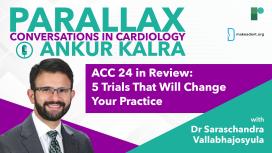
Dr Kalra and Dr Vallabhajosyula dissect the practical implications of the top 5 ACC.24 trials, answering pressing questions and addressing emerging dilemmas.
Read More
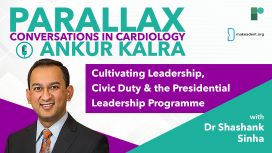
In this episode, Dr Sinha shares his insights on leadership after participating in the prestigious Presidential Leadership Scholars Programme.
Read More
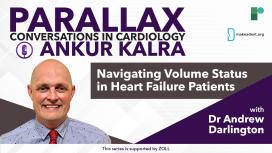
In this informative episode of Parallax, Dr Ankur Kalra is joined by Dr Andrew Darlington, an Advanced Heart Failure Cardiologist at Piedmont Heart Institute in Georgia.
Together, Dr Kalra and Dr Darlington delve into the significance of assessing volume status in patients with heart failure, highlighting its continued relevance in 2024, including the availability of new diagnostic tools, including the Heart Failure Management System (HFMS).
This series is supported by ZOLL and is intended for Health Care Professionals.
Read More
Together, Dr Kalra and Dr Darlington delve into the significance of assessing volume status in patients with heart failure, highlighting its continued relevance in 2024, including the availability of new diagnostic tools, including the Heart Failure Management System (HFMS).
This series is supported by ZOLL and is intended for Health Care Professionals.
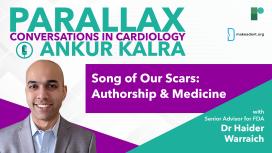
In this week's Parallax episode, Dr Ankur Kalra welcomes Dr Haider Warraich, a cardiologist at Brigham and Women's Hospital. Dr Warraich is not only a Senior Advisor for Chronic Disease to the FDA Commissioner but also a prolific author, having written three books, including "Song of Our Scars: The Untold Story of Pain." He is a regular contributor to publications like the New York Times and the Washington Post.
Read More
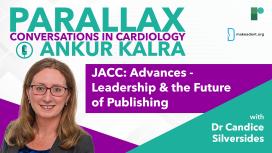
Dive into the unique synergy between her clinical practice and editorial leadership as Dr Silversides shares her vision for the journal. Learn how she navigates diverse responsibilities, manages peer reviews, and ensures fair evaluation of the submitted manuscripts. Get insights into launching a journal, from adapting to the needs of the readership and editorial board selection to time management. Dr Silversides joins Dr Kalra in exploring the evolving landscape of academic publishing, discussing the challenges and opportunities presented by AI and other advancements.
Read More
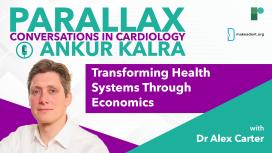
The podcast embarks on an exploration of the program's three fundamental pillars: health economics, outcomes measurement, and management. Dr. Carter underscores the importance of efficiently allocating scarce resources, evaluating health system performance through population outcomes, and translating theoretical knowledge into practical application through leadership.
Read More
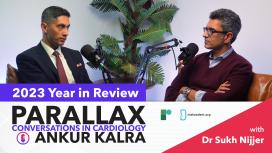
Dr Ankur Kalra welcomes back Dr Sukhjinder Nijjer for their much-anticipated annual review of advancements in cardiovascular medicine that defined the year 2023.
Read More
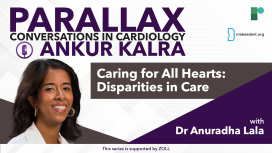
In this thought-provoking episode, Dr Ankur Kalra is joined by Dr Anuradha Lala. They delve into the critical topic of disparities in care within the healthcare system from a cardiologist's point of view and explore actionable steps towards a more inclusive and fair healthcare landscape.
This series is supported by ZOLL and is intended for Health Care Professionals.
Read More
This series is supported by ZOLL and is intended for Health Care Professionals.
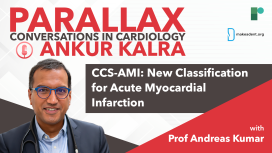
In this informative episode, Dr Kumar shares what led his team and the CCS to introduce a new classification scheme for acute MI. He discusses how research from the past 15 years highlighted the need to incorporate tissue changes resulting from acute myocardial infarction (MI) into clinical practice. Dr Kumar outlines the four stages of CCS-AMI, and we gain insight into how this novel classification scheme could impact bedside medicine.
Read More
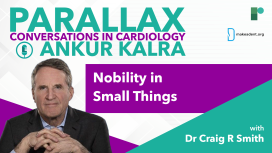
In this inspiring episode, Dr Smith delves into the story behind his book and the motivating circumstances that led him to become an author. Dr Kalra asks Dr Smith about his experience as a leader during the pandemic as a surgeon. Dr Smith shares the story of his unconventional journey into medicine, emphasizing how hard physical labor built his resilience and prepared him for his residency. Dr Kalra also asks about Dr Smith's experience as a surgeon for President Bill Clinton in 2004.
Read More

In this stimulating and thought-provoking episode, Dr. Kalra and Dr. Anavekar delve into the topic of measuring success in medicine. Dr. Anavekar puts forward the argument that the ambiguous definition of academic achievement often results in damaging biases that have long-term repercussions on the medical field. As a program director, Dr. Anavekar believes that the number of published articles should not be the only or most crucial criterion for evaluating early-career faculty. He argues that it's important to also consider the "distance travelled" by candidates. Dr. Kalra raises pertinent questions about the practical implications of this approach, and Dr. Anavekar provides candid insights into his responsibilities.
Read More

Dr Mahmoudi and Dr Täuber teamed up to explore bullying in academic settings. Together with Dr Kalra they discuss why bullies thrive in such environments and the ways institutions enable such behaviour. Dr Täuber offers solutions and a critical overview of institutional narratives, while Dr Mahmoudi highlights the long-term effects on academic work and medicine. They call for action against toxic behaviour and for stakeholders to eliminate incentives for universities to support perpetrators.
Read More

In 2018, the loss of a friend to suicide compelled Dr Anavekar to embark on a profound journey of contemplative self-exploration. Now, he uses his experience to encourage and guide trainees to pose thought-provoking questions that challenge the status quo of the materialistic approach to medicine, ultimately leading to a more outcome-focused perspective.
What is the Global Cardiology University project? How does Dr Anavekar encourage trainees to re-examine their role in patient care? What is his advice to our listeners?
Read More
What is the Global Cardiology University project? How does Dr Anavekar encourage trainees to re-examine their role in patient care? What is his advice to our listeners?

In the latest episode of Parallax, Dr. Ankur Kalra invites Dr Vijay Rao, the Governor of the Indiana Chapter of the American College of Cardiology, to share his experience and insights with the audience.
As Dr Kalra asks Dr Rao about the ways in which early career faculty members can get involved with the organization at a state level. Dr Rao shares his insider tips and highlights key events where individuals can further their participation.
How can you get involved with your local ACC chapter? How can you improve your leadership skills? What is Dr Rao’s advice for our listeners?
Read More
As Dr Kalra asks Dr Rao about the ways in which early career faculty members can get involved with the organization at a state level. Dr Rao shares his insider tips and highlights key events where individuals can further their participation.
How can you get involved with your local ACC chapter? How can you improve your leadership skills? What is Dr Rao’s advice for our listeners?

Dr Vuyisich shares his personal journey with rheumatoid arthritis and how it led him to explore the intersection of nutrition and the gut microbiome function.
He explains how the complexity of nutrition and the compounds generated by the gut microbiome can impact our health. We learn more about three compounds produced by our gut microbiome that have a strong connection with heart disease.
Through this conversation, Dr Vuyisich invites us to reframe our approach to nutrition and prevention as a question of food education and data-driven science.
Read More
He explains how the complexity of nutrition and the compounds generated by the gut microbiome can impact our health. We learn more about three compounds produced by our gut microbiome that have a strong connection with heart disease.
Through this conversation, Dr Vuyisich invites us to reframe our approach to nutrition and prevention as a question of food education and data-driven science.





